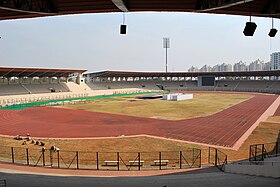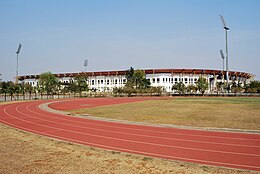| Gachibowli Stadium | |
 The interior of the GMC Balayogi Athletic Stadium The interior of the GMC Balayogi Athletic Stadium | |
| Full name | Ganti Mohana Chandra Balayogi Athletic Stadium |
|---|---|
| Location | Gachibowli, Telangana, India |
| Coordinates | 17°26′48.42″N 78°20′40.91″E / 17.4467833°N 78.3446972°E / 17.4467833; 78.3446972 |
| Owner | Sports Authority of Telangana State |
| Capacity | 18,000 |
| Field size | 105 m × 68 m (344 ft × 223 ft) |
| Surface | Grass |
| Scoreboard | Yes |
| Construction | |
| Built | 2001 |
| Opened | 2003 |
| Renovated | 2024 |
| Construction cost | €50,000,000 |
| Tenants | |
| 2003 Afro-Asian Games 2007 Military World Games Fateh Hyderabad (2016–present) Hyderabad FC (2019–present) Telangana football team | |
Ganti Mohana Chandra Balayogi Athletic Stadium, (formerly known as the Gachibowli Athletic Stadium,) or simply G.M.C.B Athletic Stadium is a multipurpose stadium situated in the Gachibowli suburb of Hyderabad, Telangana, India. It is located beside International Institute of Information Technology (IIIT), Hyderabad. The stadium is part of a sports complex built in 2002 by the N. Chandrababu Naidu Government to host the 2003 Afro-Asian Games. It is used mostly for association football matches as is it currently the home of Indian Super League club Hyderabad FC. The stadium has a capacity of 18,000 and contains an eight-lane 400m running synthetic athletic track, a 10-lane 100m sprinting track and a four-lane synthetic warm-up track. Inside the athletic tracks lies a football field 105 m × 68 m (344 ft × 223 ft) in size. It was built at a cost of Rs.35.30 crores covering a built-up area of 14,850 m (159,800 sq ft).
Structure

The highlight of the stadium's structure is the cantilevered roof covering the spectator stands. The simple yet innovative structural design allows a 25 m (82 ft) span cantilever allowing the spectators an unobstructed view of the sporting events. Diagonal yellow steel structural members act as tension members to balance out the forces of the cantilevered roof of the spectator stands. These members not only add to the exterior appearance, but also help in creation of a well-defined ambulatory path along the stadium. Orange coloured corrugated metal sheets wrap around the inner and outer edges of the roof trusses. This inexpensive cladding enhances the appearance of the stadium greatly.
It is an ultra modern stadium with eight line competition synthetic athletic track and 4-lane synthetic practice track. It uses the latest high-mast lighting for day-night events and provides obstruction-free viewing for all spectators. The stadium was named in the memory of G. M. C. Balayogi, an incumbent Speaker of Lok Sabha who died in an air crash.
The 2003 Afro-Asian Games were held in this stadium. More than 30,000 people came to watch the opening ceremony. The opening ceremony was about two hours and forty minutes long with a laser show son-et-lumiere.
About 2,800 Kuchipudi artistes performed a centuries-old dance on 26 December 2010 to earn a place in the Guinness World Records.
West block
Most of the services and administrative areas of the stadium are hosted in the west block. The west block also contains the entrance porch and lobby. The facilities hosted in the west block are:
- Public address system
- Media Centre & Press Box
- 3 service and one players’ entrance
- Score board control & Games management room
- Lighting control rooms
- Public address & announcement rooms
- VIP lounges, pantries & toilets
- Office & conference rooms
See also
- List of stadiums in Hyderabad, India
- 2003 Afro-Asian Games
- List of football stadiums in India
- Lists of stadiums
References
- "Hyd's abandoned Sports Tower transforms into Covid hospital". outlookindia.com/.
- "Welcome Our Website". Archived from the original on 1 August 2021. Retrieved 22 April 2020.
- World Stadiums Archived 24 September 2011 at the Wayback Machine; www.worldstadiums.com
- "The Tribune, Chandigarh, India - Sports Tribune". m.tribuneindia.com. Retrieved 22 April 2020.
- "gachibowli-sports-complex". Archived from the original on 1 August 2021. Retrieved 22 April 2020.
- Menon, Amarnath K. (16 December 2002). "Rs 250 crore National Games in Hyderabad enthuses organisers more than athletes". India Today. Retrieved 22 April 2020.
- "Gachibowli stadium now open for non-sporting events | Hyderabad News - Times of India". The Times of India.
- Kuchipudi Dancers... SIFY News online;
| Hyderabad topics | |||||||||||
|---|---|---|---|---|---|---|---|---|---|---|---|
| History | |||||||||||
| Government | |||||||||||
| Public buildings | |||||||||||
| Tourist attractions |
| ||||||||||
| Education | |||||||||||
| Higher education |
| ||||||||||
| Healthcare | |||||||||||
| Industry | |||||||||||
| Transport |
| ||||||||||
| Culture | |||||||||||
| Water bodies in and around Hyderabad | |||||||||||
| National parks around Hyderabad | |||||||||||
| Monuments and memorials | |||||||||||
| Sport |
| ||||||||||
| Other topics | |||||||||||
| Indian Super League stadiums | |||
|---|---|---|---|
| Current | |||
| Former | |||
- Football venues in Telangana
- Sports venues in Telangana
- Rugby union stadiums in India
- Kabaddi venues in India
- Multi-purpose stadiums in India
- 2003 establishments in Andhra Pradesh
- Sports venues completed in 2003
- American football venues in India
- Sports venues in Hyderabad, India
- Athletics (track and field) venues in India